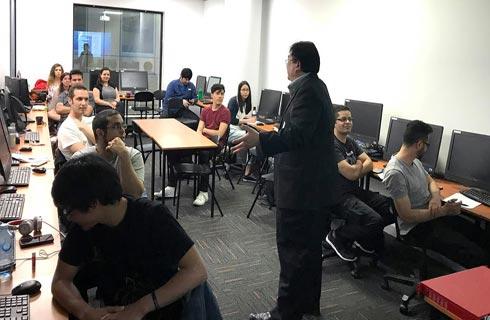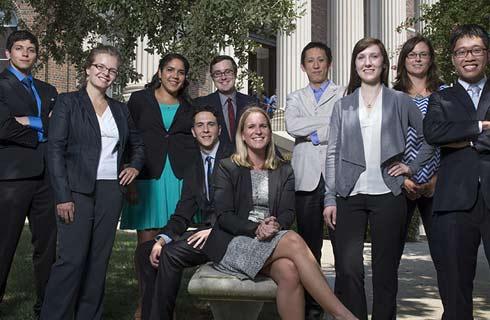国际学生入学条件
To be considered for admission to the School of International Affairs, all applicants must complete The Graduate School's online application, which includes:
Two (2) Letters of Recommendation
Recommendation letters should be written by individuals well placed to discuss your academic qualifications for graduate study (unless you are five or more years removed from your undergraduate studies).
Recommendations that come from former supervisors should comment on and provide examples of your performance as an intern and/or an employee, including the nature of your work and what you contributed to the company or organization.
Please note that letters from personal acquaintances or those who are not familiar with your academic or professional qualifications are not helpful to the admissions committee.
Current Résumé or CV
Provide a current résumé or curriculum vitae, which includes your education, employment history, awards and accolades, international exposure, publication credits, and leadership roles in any volunteer and/or extracurricular activities.
Transcripts
You are required to upload copies of official transcripts/records/degree certificates from all institutions you've attended. All transcripts and academic records uploaded to the application are then considered “unofficial” and will be used for application purposes only.
Official/original transcripts/records/degree certificates are required for any degree or diploma earned, as well as any and all institutions attended that are listed on your application to the Graduate School. If you are recommended for admission to a graduate degree plan of study, you will be notified with detailed instructions on how to submit the documents.
GRE Scores (optional)
GRE scores are optional.
Applicants do not need to submit GRE scores to be considered for admission or merit-based scholarships.
Applicants wishing to submit GRE scores are welcome to do so should they choose. However, not submitting GRE scores will not negatively impact your application in any way.
Statement of Purpose- The Admissions Committee seeks students that show promise for success in graduate school. As such, the statement of purpose is a critical part of the application.
All applicants are required to submit an essay that answers one of the two questions below:
As part of your statement of purpose, describe your academic and research interests, career objectives, how a degree from SIA will enable you to achieve your goals, and what unique skills, talents, and/or perspectives you will bring to our program. Please be specific.
-OR- Please discuss an issue of global importance you wish to address in your professional career. Please include how SIA will prepare you to address this global issue.
Applicants whose native language is not English must submit either an official Test of English as a Foreign Language (TOEFL) or International English Language Testing System (IELTS) score report demonstrating an adequate knowledge of English. The Institutional TOEFL (ITP) and Duolingo Exam are not accepted.
The minimum scores considered acceptable for admission by the Graduate School are:
TOEFL—80 on the Internet-based test (iBT)
IELTS—An overall band of 6.5 on the Academic Examination
Paper-based test (taken prior to July 2017) – the minimum acceptable score is 550.
Paper-based test (taken July 2017 or later) – a combined total of the 3 sections evaluated must be 60 or greater.
展开
IDP—雅思考试联合主办方

雅思考试总分
6.5
- 雅思总分:6.5
- 托福网考总分:80
- 托福笔试总分:550
- 其他语言考试:NA
CRICOS代码:
申请截止日期: 请与IDP联系 以获取详细信息。
课程简介
我们的42个学分的国际事务硕士(MIA)在宾夕法尼亚州立大学帕克分校校园为期两年。第一年包括一门核心课程,为国际交流的机构,传统和机制提供扎实的学术基础。这些核心课程涵盖针对多维解决问题的关键分析工具的有针对性的研究,与最重要的社会文化交流理论的接触以及开始在国际上开展工作所必需的专业技能。为了满足42学分的毕业要求,除了下面列出的必修核心课程以外,大多数学生都参加了选修课。在第三和第四学期,学生根据他们的专心领域和顶峰经验参加一些课程。
This concentration prepares students to confront the challenges that confront policy makers in diverse international contexts, in addressing the pressing need to raise the standard of living for their citizens. Students will identify and grapple with policy interventions aimed at narrowing the gap between developed nations and emerging markets - in economic, technological and social terms. The past two centuries have witnessed a dramatic widening of international inequality. In 1800 the average citizen in the richest countries of the world was approximately four times as well off as the average citizen in the poorest nation. By 2000, that statistic had grown to forty times. Such disparities carry significant consequences for international relations. Employment, migration, trade and production patterns have been materially affected. Technology has both influenced and responded to these trends.
展开







 预科
预科 奖学金
奖学金 实习机会
实习机会 在校学习
在校学习 跨境学习
跨境学习 校园授课-线上开始
校园授课-线上开始 在线/远程学习
在线/远程学习


 滑铁卢大学
滑铁卢大学

 达尔豪斯大学
达尔豪斯大学

 温尼伯大学
温尼伯大学

 温尼伯大学
温尼伯大学

 渥太华大学
渥太华大学

 菲莎河谷大学
菲莎河谷大学









 美国
美国





